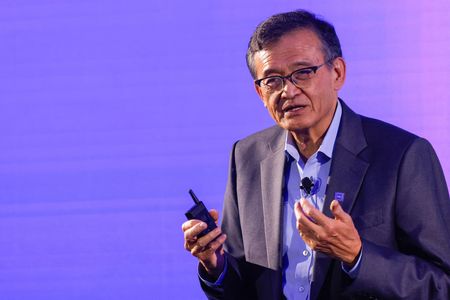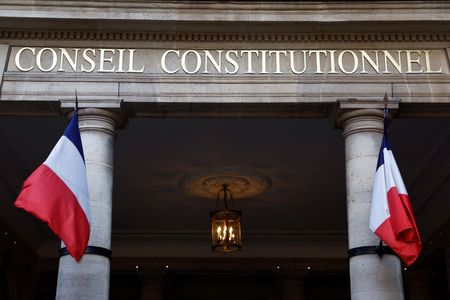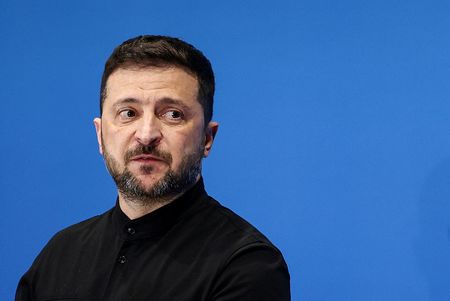By Aditya Soni
(Reuters) -U.S. President Donald Trump on Thursday demanded the immediate resignation of new Intel CEO Lip-Bu Tan, calling him “highly conflicted” due to his ties to Chinese firms and raising doubts about plans to turn around the struggling American chip icon.
Reuters reported exclusively in April that Tan invested at least $200 million in hundreds of Chinese advanced manufacturing and chip firms, some of which were linked to the Chinese military.
Trump’s comments came a day after Reuters was first to report that Republican Senator Tom Cotton had sent a letter to Intel’s board chair with questions about Tan’s ties to Chinese firms and a recent criminal case involving his former firm Cadence Design.
“The CEO of INTEL is highly CONFLICTED and must resign, immediately. There is no other solution to this problem,” Trump said in a post on his Truth Social platform.
Intel shares closed down 3% on Thursday.
A leadership change could pile pressure on Intel, which is a pillar of U.S. efforts to boost domestic chipmaking. Last year, it secured $8 billion in subsidies, the largest outlay under the 2022 CHIPS Act, to build new factories in Ohio and other states.
Trump’s intervention marked a rare instance of a U.S. president publicly calling for a CEO’s ouster and sparked debate among investors.
“It would be setting a very unfortunate precedent. You don’t want American presidents dictating who runs companies, but certainly his opinion has merit and weight,” said Phil Blancato, CEO of Ladenburg Thalmann Asset Management.
David Wagner, head of equity and portfolio manager at Intel shareholder Aptus Capital Advisors, said while “many investors likely believe that President Trump has his hand in too many cookie jars, it’s just another signal that he’s very serious about trying to bring business back to the U.S.”
Intel and Tan, who took over as CEO in March, did not immediately respond to Reuters requests for comment.
In response to the Reuters story on Wednesday about a U.S. lawmaker questioning Tan’s ties to China, an Intel spokesperson said the company and its CEO were deeply committed to the national security of the U.S. and the integrity of their role in the U.S. defense ecosystem.
Reuters reported in April that Tan himself, and through venture funds he has founded or operates, invested in Chinese firms including contractors and suppliers for the People’s Liberation Army between March 2012 and December 2024.
The reporting was based on a review of Chinese corporate databases cross-referenced with U.S. and analyst lists of firms with connections to the Chinese military.
Reuters identified 20 investment funds and companies where his venture capital firm Walden is currently a joint owner along with Chinese government funds or state-owned enterprises, according to Chinese corporate records.
The government funds were mostly from municipal governments of Chinese tech hubs like Hangzhou, Hefei and Wuxi.
A source familiar with the matter had at the time told Reuters that Tan had divested his positions in entities in China, without providing further details.
Chinese databases reviewed by Reuters at the time had listed many of his investments as current, and Reuters was at the time unable to establish the extent of his divestitures.
Tan, a Malaysian-born Chinese American business executive, was also the CEO of Cadence Design from 2008 through December 2021 during which the chip design software maker sold products to a Chinese military university believed to be involved in simulating nuclear explosions.
Cadence last month agreed to plead guilty and pay more than $140 million to resolve the U.S. charges over the sales, which Reuters first reported.
“We don’t believe Lip-Bu is ‘conflicted,’ though given the nature of this administration the China ties are seemingly creating an increasingly bad look,” Bernstein analyst Stacy Rasgon said.
“And unfortunately, unlike other tech CEOs Lip-Bu does not appear to have cultivated the kind of personal relationship with Trump that would help to assuage his ire.”
A White House official said, “President Trump remains fully committed to safeguarding our country’s national and economic security. This includes ensuring iconic American companies in cutting-edge sectors are led by men and women who Americans can trust.”
BUSINESS TURMOIL
Once the bedrock of Silicon Valley’s global dominance in chips, Intel in recent years lost its manufacturing edge to Taiwanese rival TSMC.
It also has virtually no presence in the booming market for artificial intelligence chips dominated by Nvidia and has been losing market share in data centers and personal computer – long its stronghold – to rival AMD.
Intel shares have been nearly flat in 2025, after dropping more than 60% last year. The company’s market value has fallen below $100 billion at a time when Nvidia has become the first $4 trillion company.
Intel’s profit margins – once the envy of the industry – are also at about half their historical highs.
Late last year, the company fired its then CEO Pat Gelsinger well before the completion of his four-year roadmap to restore Intel’s lead in making the fastest and smallest computer chips.
The ousting followed a Reuters special report in October that Intel had failed to live up to the lofty ambitions he had set for manufacturing and AI capabilities, ultimately losing or canceling contracts under his watch and scrapping a revenue forecast he made even though it exceeded Intel’s own estimates.
To revive Intel’s fortunes, the board named former board member Tan as CEO, betting on his deep roots in the chip industry and track record as a longtime investor in promising tech startups.
Tan has largely abandoned his predecessor’s strategy, aggressively shrinking the company’s workforce and putting on hold planned manufacturing plants globally.
The production process that Intel hoped would pave the way to winning manufacturing deals and restore its edge in churning out high-end, high-margin chips is also facing a big hurdle on quality as it puts newer technologies to the test, Reuters reported earlier this month.
Intel has also further slowed the pace of construction of a factory in Ohio, now expected to be completed around 2030 or 2031.
Ohio Republican U.S. Senator Bernie Moreno said on X that it is “pretty obvious” that Intel failed its commitments to the state and that Ohio should start a fraud investigation.
(Reporting by Aditya Soni in Bengaluru, additional reporting by Kritika Lamba, Akash Sriram, Johann M Cherian and Arsheeya Bajwa in Bengaluru and David Shepardson, Doina Chiacu and Brendan O’Brien in Washington; Editing by Peter Henderson and Anil D’Silva)










